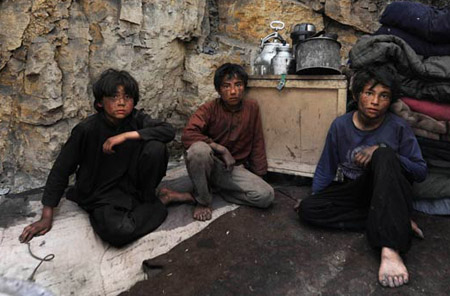Excavation of the country’s largest coalmine in northern Samangan province was underway in an unregulated way since long, an official said on Tuesday.
This coal reserves is situated 117 kilometres to the west of Aibak City, the provincial capital in the Dara-i-Suf district. The mine has rich coals quality coals where 300 tunnels had been dug so far.
The government has some control on five tunnels while the rests are managed by locals in an illegal way.
Ahmad Ali Hussaini, district administrative chief, told Pajhwok Afghan News local have been involved in illegal excavation of coal. More than 200 tunnels were dug by the locals in the mine.

Young Afghan miners take a rest at a coal mine in Samangan province, north of Kabul on April 3, 2012. (Photo: AFP)
However, Eng. Naseer Ahmad Durani, deputy mines manager, said a total of 232 tunnels existed in the Dara-i-Suf coal mine where excavation of only five tunnels was legalized.
Officials of the mining and petroleum ministry said qualified engineers and technicians were appointed for the excavation of coals on the tunnels under government control.
The constitution has clear clauses about extraction of natural resources in the country but local groups and influential are trampling established laws by excavating natural resources without any legal cover.
Under article nine of the law, all mines and underground riches belonged to the state. “Mines, underground riches and artifacts are the property of government. The safety and usage procedures of natural resources are organized in line with law,” the article added.
But the Ministry of Mines raised tunnel issue at a time when recently a tunnel collapsed in Dahan-i-Tor area of Dara-i-Souf district earlier this year.
Samangan Governor Khairullah Anosh said gas density and blasts led to the collapse of a tunnel, leaving 24 labourers dead and five wounded.
Abdur Rahman Afghan, north Coal Enterprise head, said some tunnels were irresponsibly extracted by people for extracting coals. As a result, he said extraction process was ongoing in an unregulated manner.
He said they always directed individuals working in mining tunnels to use modern tools while working but they could not pressurize owners of the tunnels.
Ahmad, 30, who earlier worked in a non-government mining tunnel, said they used shovel and other local tools for extracting coals.
“The tunnel owner gave us 400 afghanis in exchange for extracting per tonnes of coal. I was expelled because I could not dig the needed coal amount,” he added.
A number of Samangan provincial council members also complained about unauthorized extraction of Soof coalmine.
Mohammad Iwaz Baig Oghali, a provincial council member, said he and his colleagues time and again shared the issue with the provincial officials and ministry but no action could be taken to ameliorate the situation.
Javed Noorani, an expert on mine affairs, said lack of a good management and rampant corruption in mines sector have cost government to lose control over illegal extraction of mines.
“I am sure no one of his own can extract mine unless without the connivance of government officials who receive bribe,” he added. Lack of a proper mechanism for mines extraction has led to workers’ death. The ministry of mines does not oversee and investigate about the mines extraction.
Ahmad Ali Hussaini, Dara-i-Soof district chief, said many security check posts were established in the area to control the extracted coal.
“We get 1,500 afs from each buyer of coal as tax. At least 1,550,000,000 afs have been deposited to the government revenue,” he added.
As mines sector officials and residents of Soof complained about extraction of the coalmine in illegal way, the government does not pay attention to control the situation.



